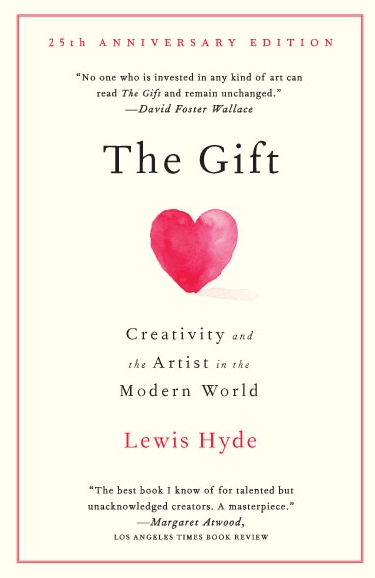Lewis Hyde’s The Gift:
Gifts vs Commodities:
A work of art is a gift, not a commodity. Or, to state the modern case with more precision, that works of art exist simultaneously in two “economies”, a market economy and a gift economy. Only one of these is essential, however: a work of art can survive without the market, but where there is no gift there is no art.
{…}
Gifts must move.
{…}
In the world of gift…you not only can have your cake and eat it too, you can’t have your cake unless you eat it. Gift exchange and erotic life are connected in this regard. The gift is an emanation of Eros, and therefore to speak of gifts that survive their use is to describe a natural fact: libido is not lost when it is given away. Eros never wastes his lovers. When we give ourselves in the spirit of that god, he does not leave off his attentions; it is only when we fall to calculation that he remains hidden and no body will satisfy. Satisfaction derives not merely from being filled but from being filled with a current that will not cease. With the gift, as in love, our satisfaction sets us at ease because we know that somehow its use at once assures its plenty.
… A commodity has value and a gift does not. A gift has worth… I mean “worth” to refer to those things we prize and yet say “you can’t put a price on it.” We derive value, on the other hand, from the comparison of one thing with another. “I cannot express the value of linen in terms of linen,” says (Karl) Marx in the classic analysis of commodities which opens his Capital. Value needs a difference for its expression; when there is no difference we are left with tautology (“a yard of linen is a yard of linen). The phrases “exchange value” and “market value” carry the sense of “value” I mean to mark here: a thing has no market value in itself except when it is in the marketplace, and what cannot be exchanged has no exchange value.
Gifts create bonds and communities; commodities do not:
It seems no misnomer that we have called those nations known for their commodities “the free world.” The phrase doesn’t seem to refer to political freedoms; it indicates that the dominant form of exchange in these lands does not bind the individual in any way — to his family, to his community, or to the state.
A gift community puts certain constraints on its members, yes, but these constraints assure the freedom of the gift. “Academic freedom,” as the term is used in the debate over commercial science, refers to the freedom of ideas, not to the freedom of individuals. Or perhaps we should say that it refers to the freedom of individuals to have their ideas treated as gifts contributed to the group mind and therefore the freedom to participate in that mind. The issue arises because when all ideas carry a price, then all discussion, the cognition of the group mind, must be conducted through the mechanisms of the market which … is a very inefficient way to hold a discussion. Ideas do not circulate freely when they are treated as commodities.
Not all labor should be paid. Our society depends on gift labor and it should be an honor to perform it:
We must therefore distinguish the necessary feminist demand for “equal pay for equal work” form the equally important need to keep some parts of our social, cultural, and spiritual life out of the marketplace. We must not convert all gift labors into market work lest we wake one day to see that universal market in which all our actions earn a wage and all our goods and services bear a price. There is a place for volunteer labor, for mutual aid, for in-house work, for healings that require sympathetic contact or a cohesive support group, for strengthening the bonds of kinship, for intellectual community, for creative idleness, for the slow maturation of talent, for the creation and preservation and dissemination of culture, and so on. To quit the confines of our current system of gender means not to introduce market value into these labors but to recognize that they are not “female” but human tasks. And to break the system that oppresses women, we need not convert all gift labor to cash work; we need, rather, to admit women to the “male,” moneymaking jobs while at the same time including supposedly “female” tasks and forms of exchange in our sense of possible masculinity.
Gift exchange vs commodity consumption:
The desire to consume is a kind of lust. We long to have the world flow through us like air or food. We are thirsty and hungry for something that can only be carried inside bodies. But consumer goods merely bait this lust, they do not satisfy it. The consumer of commodities is invited to a meal without passion, a consumption that leads to neither satiation nor fire. He is a stranger seduced into feeding on the drippings of someone else’s capital without benefit of its inner nourishment, and he is hungry at the end of the meal, depressed and weary as we all feel when lust has dragged us from the house and led us to nothing
Gift exchange has many fruits…and to the degree that the fruits of the gift can satisfy our needs there will always be pressure for property to be treated as a gift. This pressure, in a sense, is what keeps the gift in motion.
Read this book if you want to look at art and life in a completely new way. DFW was right — you will not remain unchanged.
MM



One thought on “The Best Thing I Read This Week Is …”